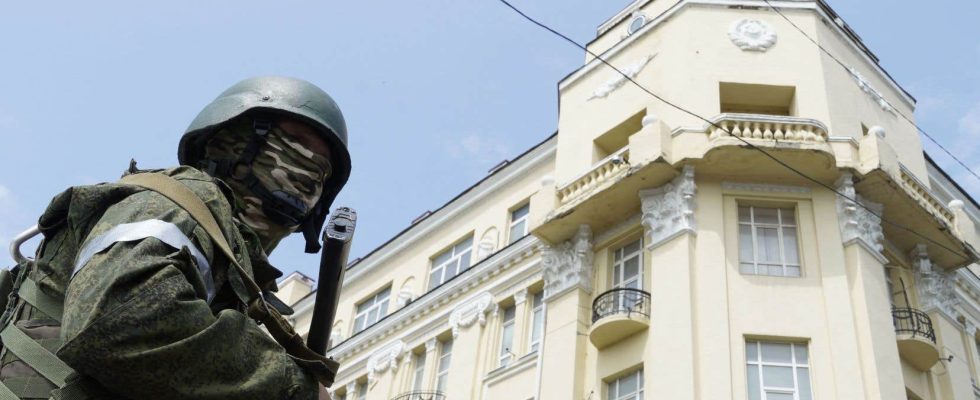The forces of the paramilitary group Wagner are gradually withdrawing to Russia on Sunday after the abortive coup by their leader Evguéni Prigojine, under an agreement with Vladimir Putin who is emerging weakened from this unprecedented crisis.
Yevgeny Prigojine must leave for Belarus, the Russian presidency announced on Saturday evening, without it being known, on Sunday, when this departure in the guise of exile is planned, or where the tempestuous boss of Wagner is.
During a 24-hour spree that took his militias less than 400 km from Moscow, or even 200 according to him, he shook the Kremlin before turning around and ordering his men to return to their bases, after mediation by the Belarusian leader Alexander Lukashenko, the Kremlin’s only European ally.
A sign that the urgency of the crisis seems to have passed, Wagner’s fighters left the Voronezh and Lipetsk regions, south of Moscow, on Sunday, stages of their attempt to reach the capital, according to local authorities.
The day before, they had left the military HQ which they had seized in Rostov (south-west), the nerve center of operations in Ukraine, signaling the end of this mutiny in order to avoid “a bloodbath”, according to the words by Yevgeny Prigozhin.
However, in the Russian capital as in its region, the “anti-terrorist operation regime”, which gives increased powers to the police, remains in force on Sunday.
Large police patrols were deployed along the road leading to the exit of Moscow in the south of the capital, noted an AFP journalist. Monday will be a non-working day in Moscow.
This is where Wagner’s men and their tanks could have arrived, had they continued their march to obtain the heads of the Minister of Defense, Sergei Shoigu, and that of the Chief of Staff, Valery Gerasimov, accused of having sacrificed for nothing tens of thousands of men in Ukraine.
Announcing the agreement reached with the one who, a few hours earlier, had promised “to liberate the Russian people”, Kremlin spokesman Dmitry Peskov had welcomed “a resolution without new losses” of the crisis.
Criminal proceedings against Yevgeny Prigojine will be dropped and none of the fighters of the Wagner group, which plays a key role alongside the Russian army in Ukraine, will be prosecuted even though they had taken up arms against the Kremlin.
“No one will persecute [les combattants]given their merits on the Ukrainian front, assured Dmitry Peskov.
The Russian authorities had never before shown such leniency, throwing in prison opponents and anonymous critics of Vladimir Putin and his offensive against Ukraine.
Serious weaknesses
For an adviser to the Ukrainian presidency, Mykhaïlo Podoliak, “Prigojine humiliated Putin [et] the state and [il] has shown that there is no longer a monopoly on violence”.
“The Kremlin now faces a deeply unstable balance […] The Prigozhin rebellion revealed serious weaknesses,” underlines an analysis by the American think tank Institute for the Study of War (ISW).
Extraordinary scene on Saturday evening in Rostov, dozens of residents showed their support for the insurgents, chanting “Wagner, Wagner! shortly before the fighters, with their leader at the head of the convoy, left the city.
“The crisis of institutions and trust was not obvious to most in Russia as in the West. Today it is clear, “says Konstantin Kalachev, an independent Russian political scientist.
“The way the people of Rostov supported Wagner’s departure speaks volumes,” he notes.
” Civil war “
If the terms of the agreement remain subject to speculation, President Lukashenko, a close ally of Mr. Putin, seems to have played a key role.
The Kremlin has expressed its “appreciation” to the Belarusian leader, usually in a relationship of almost total dependence on Moscow.
Faced with his greatest challenge since coming to power at the end of 1999, President Putin had denounced a “betrayal” of the one who was in charge of the Russian base works, promising a “punishment” and raising the specter of a “civil war”.
The events were closely watched by Western governments. According to washington post and the New York Timesthe American intelligence services had warned the White House of the imminence of a Wagner revolt in Russia.
Russian diplomacy had warned Western countries against any attempt to “take advantage of the situation”.
And Moscow has warned that Wagner’s failed rebellion will “in no way” affect the Russian offensive in Ukraine.
A Russian air attack on kyiv carried out on Saturday in the early hours of the day killed five people, according to the report updated on Sunday by the mayor of the Ukrainian capital.
“The myth of the unity of Putin’s Russia is over. This internal escalation is dividing the Russian military alliance,” Italian Foreign Minister Antonio Tajani told Il Messaggero newspaper.
“This is the inevitable result of supporting and funding a legion of mercenaries,” he added.
North Korea has thrown its support behind Russia, with Deputy Foreign Minister Im Chon expressing “his firm belief that the recent armed rebellion in Russia will be successfully put down”, according to the official Korean Central News agency. Agency (KCNA).
Chinese Foreign Minister Qin Gang met Russian Deputy Foreign Minister Andrey Rudenko on Sunday in Beijing, the Chinese Foreign Ministry said, without further details of the discussions.
While the Wagner militia plays a leading role in the conflict in Ukraine, tensions with the general staff have increased over the months.
Yevgeny Prigojine had notably accused him of depriving Wagner of ammunition, insulting in particular the Minister of Defense, Sergei Shoigu, a friend of Vladimir Putin.
